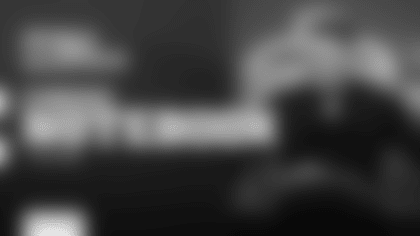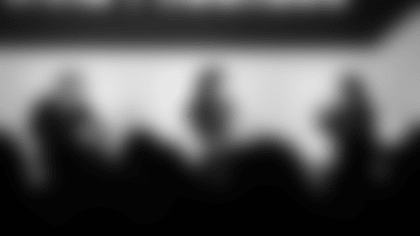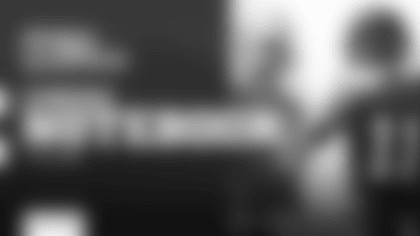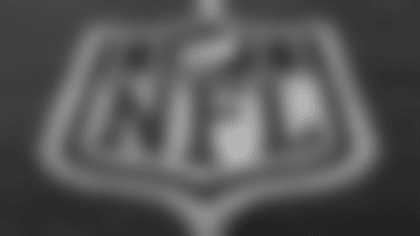WESTFIELD, Ind. — Every new NFL season brings with it some rule changes — whether experimental or permanent — as well as major points of emphasis for officials to keep an eye on each and every week.
The 2019 season will certainly be no different. After a controversial no-call late in the NFC Championship Game between the Los Angeles Rams and the New Orleans Saints, the primary focus will almost certainly be on a revamped set of pass interference guidelines that allow head coaches to challenge offensive and defensive pass interference penalties — whether called on the field or not — up to the two-minute warning of each half.
That change, as well as several other additions and points of emphasis, were highlighted Sunday at Grand Park Sports Campus in Westfield, Ind., where NFL officials met with members of the media to go over the 2019 rulebook.
Here are some highlights:
» The new pass interference replay rules are obviously the most noteworthy changes heading into 2019. Not only can coaches challenge plays in which they believe there was offensive or defensive pass interference up to the two-minute warning of each half, but all passing plays will be subject to review for pass interference when there is "clear and obvious visual evidence" that a foul may or may not have occurred.
This rule is experimental, meaning it's only officially in play for the 2019 season, but it could be made permanent in 2020 and beyond.
Colts head coach Frank Reich told reporters in June that his staff was already working on figuring out how to best prepare for in-game situations of possible pass interference in which he might want to throw a challenge flag.
"Yeah, we've talked a lot about that with our analytics guys that we talk to during the game," Reich said. "We probably talk about it almost every week even in the offseason since that has been done – look at a few clips here and there and talk about strategy."
Reich said George Li, the Colts' senior football strategy analyst who is heavily involved in game management, "does a really good job on that stuff of helping us all think through a lot of the different scenarios."
"He is always looking at additional clips and will look at things and say, 'Hey, what do you think here? Hey, here is a strategy. We need to hold these timeouts or we need to hold these challenges.' And so on and so forth." Reich said. "So that's an on-going discussion. It's a group discussion. You really have to collaborate to think through all the scenarios that could come up because those are big decisions."
» Another rules modification that will inevitably pop up this season is the elimination of the blindside block. In an effort to enhance player safety, it's now a foul "if a player initiates a block in which he is moving toward or parallel to his own end line and makes forcible contact to his opponent with his helmet, forearm or shoulder." Previously, a foul was only supposed to be called in this instance if the block was targeted to the head or neck area.
A league video played by officials at Sunday's session with reporters in Westfield indicated blockers are still able to move in the way of opposing players who might've been targets of blindside blocks in the past; they just can't make forcible contact.
» Player celebrations are always a hot-button issue when it comes to the NFL rulebook, and that subject will be addressed yet again this year. A new rule prohibits players who are not in uniform from running onto the field to celebrate touchdowns/big plays. This will result in an unsportsmanlike conduct penalty on the offending team.
» If a penalty called on the field negates a touchdown, officials will now review the play to see when the penalty occurred. If it happened after the score, then the touchdown can count.
» Previously, all touchdowns were automatically reviewed. While that will remain the case, now all two-point tries will be automatically reviewed. Coaches will no longer have the option of challenging the outcome of a two-point play.
» The lowering-the-head rule that was put into place last year as an experiment is now permanent. According to the rule, "it is a foul if a player lowers his head to initiate and make contact with his helmet against an opponent. This rule pertains to all players on the field, and to all areas of the field." Players can be ejected for use-of-helmet fouls.
» Another experimental rule from last year has been made permanent. In 2018, owners voted to change the kickoff rules due to player safety, keeping five players from the kicking team on each side of the ball who cannot line up more than one-yard from the restraining line; at least two players on the kicking team must also be lined up outside the yard-line number and two players between the inbounds lines (hash marks) and the yard-line number.
On the receiving team, at least eight players must be lined up in the 15-yard "setup zone" prior to kickoff; only three receiving-team players can remain outside of the setup zone. Wedge blocks are also no longer permitted.
Also, "until the ball is touched or hits the ground, no player on either the receiving or kicking team may block within the 15-yard area from the kicking team's restraining line. On an onside kick, the kicking team may not block in the first 10 yards."
These rules all have helped drastically reduce the number of nasty collisions that were occurring during kickoff plays.















